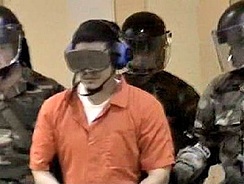It Could Be You: The Sad Story of Jose Padilla, Tortured and Denied Justice

For nine and a half years — almost as long as the “war on terror” has been providing an excuse for paranoia about Muslims in general — the case of US citizen Jose Padilla has demonstrated, to those willing to pay attention, that something has gone horribly wrong in the United States of America.
A former gang member and a convert to Islam, Padilla was arrested at Chicago’s O’Hare Airport, in connection with an alleged “dirty bomb plot” that never existed, on May 8, 2002, as he returned from Pakistan. Held for a month as a material witness, he was then designated an “enemy combatant” by President George W. Bush, and held in complete isolation in a military brig for the next three and half years — a process that also involved prolonged sensory deprivation. According to the psychiatrist Dr. Angela Hegarty, who spent 22 hours with Padilla in 2006, “What happened at the brig was essentially the destruction of a human being’s mind.”
In November 2005, fearing that Padilla might successfully challenge the government’s argument that it had the right to hold a US citizen indefinitely without charge or trial on the US mainland, and subject him to torture, the Bush administration suddenly indicted Padilla on charges of conspiracy “to murder, kidnap and maim people overseas,” and transferred him out of the brig. However, the injustice did not come to an end, as the courts then took over.
The charges against Padilla were based on the Bush administration’s claim that, along with alleged facilitators Adham Amin Hassoun and Kifah Wael Jayyousi, he was part of a Florida-based plot to aid Islamic extremists in holy wars abroad, and his trial took place in the summer of 2007. However, the judge, Marcia Cooke, refused to allow Padilla or his lawyers to make any mention of what had happened in the three and a half years that he was held in a legal black hole.
On August 16, 2007, the jury found him guilty, and on January 22, 2008, he received a sentence of 17 years and 4 months. This was in spite of the fact that the conspiracy in which he was reportedly involved had not taken place, and he had been involved in only seven of the hundreds of phone calls monitored by the FBI between his two co-defendants (who also received prison sentences). It also came about in spite of the fact that all that could be confirmed of his intent, in physical terms, was his signature on an application form for a military training camp in Afghanistan that he may or may not have actually attended.
Padilla appealed against his sentence, and so did the Bush administration, whose position — that his sentence was too lenient — was adopted by the Obama administration, which has repeatedly clung to the same position maintained by its predecessor when it comes to “national security” issues involving terrorism.
Two weeks ago, the latest phase in this alarming saga of paranoia, torture and injustice took place in Florida, when the Court of Appeals for the Eleventh Circuit not only backed the government against Padilla, but went so far as to vacate the original sentence (PDF), in effect telling the judge that she had been too lenient, and that she should revisit her ruling and hand down a much longer sentence.
The majority judges in the three-judge panel — the notoriously right-wing judges Joel F. Dubina and William Prior — claimed that Padilla’s original sentence was “substantively unreasonable because it does not adequately reflect his criminal history, does not adequately account for his risk of recidivism, was based partly on an impermissible comparison to sentences imposed in other terrorism cases, and was based in part on inappropriate factors.”
The dissenting judge, Rosemary Barkett, was thoroughly critical of her colleagues’ actions, specifically noting that:
In reversing Padilla’s sentence, the majority fails to adhere to the principles articulated by the Supreme Court and this Circuit requiring appellate courts to accord the trial judge the “considerable discretion” granted district courts in sentencing and to guard against substituting its judgment for that of the trial judge.
Continuing, she referred to a precedent from the Eleventh Circuit, in which, in a case in 2009, it was noted:
We may vacate a sentence because of the variance only if we are left with the definite and firm conviction that the district court committed a clear error of judgment in weighing the … factors by arriving at a sentence that lies outside the range of reasonable sentences dictated by the facts of the case. However, that we might reasonably have concluded that a different sentence was appropriate is insufficient to justify reversal.
Judge Barkett also took exception to her colleagues’ arguments that the trial judge had erred when she refused to give Padilla a sentence that was a minimum of 30 years, as they thought appropriate according to sentencing guidelines. Spelling out what judicial discretion means, she again referred to the precedent from the Eleventh Circuit in 2009, in which it was noted:
The district court must evaluate all of the … factors when arriving at a sentence, but is permitted to attach great weight to one factor over others. In assessing the factors, the sentencing court should remember that each convicted person is an individual and every case is a unique study in the human failings that sometimes mitigate, sometimes magnify, the crime and the punishment to ensue.
Primarily, however, Judge Barkett was concerned to point out that a sentence less than the full maximum could be justified when, as in Padilla’s case, “the trial judge correctly concluded that a sentence reduction is available to offenders who have been subjected to extraordinarily harsh conditions of pre-trial confinement.”
Judge Cooke may have refused to allow any discussion of Padilla’s torture in his trial, but she did note that the conditions in which he was held “were so harsh that they warrant consideration,” and, as Judge Barkett noted, Padilla had been able to highlight his torture when he was being sentenced which was so harrowing that it was not easy to ignore, As she wrote in her dissenting opinion:
Padilla presented substantial, detailed, and compelling evidence about the inhumane, cruel, and physically, emotionally, and mentally painful conditions in which he had already been detained for a period of almost four years. For example, he presented evidence at sentencing of being kept in extreme isolation at the military brig in South Carolina where he was subjected to cruel interrogations, prolonged physical and mental pain, extreme environmental stresses, noise and temperature variations, and deprivation of sensory stimuli and sleep.
Judge Barkett also highlighted one more area in which her Eleventh Circuit colleagues had crossed a line, which concerned their allegations about his perceived susceptibility to recidivism. Even though, after serving his sentence, Padilla would be “in his mid-fifties,” and “subject to a twenty-year term of supervised release,” her fellow judges nevertheless concluded that Judge Cooke “erred in determining that Padilla will not pose a high risk of recidivism.”
Even though there was no evidence to support the judges’ fears, and even though they explicitly stated in their opinion that a trial judge is allowed to “find that recidivism generally decreases with age,” she noted that the majority “not only rejects that presumption for Padilla, but goes one step further and decides that trial judges may no longer consider, for anyone convicted of a terrorism-related offense, the likelihood that the risk of recidivism will decrease with age.”
Judge Barkett’s dissenting opinion was important, but unfortunately it did nothing to stem the institutionalized paranoia and injustice that has plagued Jose Padilla since he was imprisoned as an “enemy combatant” in May 2002.
I have never understood how far too many Americans accepted the torture of Jose Padilla — an American citizen on US soil, and not even a foreigner held at Guantánamo — without recognizing that, although a Latino Muslim convert was today’s “enemy combatant,” tomorrow it might be some other demonized American.
I was also astonished when no one cared that Padilla’s torture was not mentioned in his trial, and he received a sentence of seventeen years and four months for little more than a thought crime.
The ruling by the Court of Appeals for the Eleventh Circuit two weeks ago only adds to the bitter legacy of Jose Padilla’s brutalization at the hands of his own government, revealing how, for terror suspects held as “enemy combatants” — like Padilla, or, again, the prisoners at Guantánamo — all sense of proportion can be dismissed, even by those who should know better.
For these scaremongers, who are found in Congress as well as the courts, the end result of their sustained hysteria about terrorism is a twisted version of reality in which it is legitimate to complain that sentences are not long enough, and that the crime of terrorism is so unique and dangerous that judges can argue that there is no possibility of being reformed — even when, as in Jose Padilla’s case, the US government actually spent three years destroying his mind through torture, rendering him largely incapable of anything, and without anyone responsible for that being held accountable.
___________________________________________________________________________________________________________________________

Andy Worthington is the author of The Guantánamo Files: The Stories of the 774 Detainees in America’s Illegal Prison (published by Pluto Press, distributed by Macmillan in the US, and available from Amazon — click on the following for the US and the UK). To receive new articles in your inbox, please subscribe to my RSS feed (and I can also be found on Facebook and Twitter). Also see my definitive Guantánamo prisoner list, updated in January 2010, details about the new documentary film, “Outside the Law: Stories from Guantánamo” (co-directed by Polly Nash and Andy Worthington, and launched in October 2009), and, if you appreciate my work, feel free to make a donation.
___________________________________________________________________________________________________________________________
Published here: Andy Worthington's Blog
URL: http://www.a-w-i-p.com/index.php/2011/10/05/it-could-be-you-the-sad-story-of-jose-pa
























